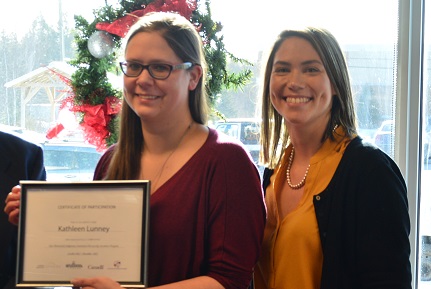One perk of the region’s startup community is its close-knit environment makes it feel like one big family. That’s especially the case for Melissa and Katie Lunney.
Melissa, 30, and Katie, 27, are sisters and members of the Elsipogtog First Nation, who got into entrepreneurship through the Joint Economic Development Initiative, a non-profit in Fredericton that encourages Indigenous entrepreneurship.
“I didn’t even think about starting a business until my sister told me about the program,” said Katie, who completed JEDI’s incubator program in September. There, she created her company Lunney Development, which develops websites and manages social media for its clients.
Katie is now in the second week of the accelerator program, which is focusing on scaling and exporting. She still works closely alongside her sister, who is a market access officer with JEDI.
On top of working full-time with the non-profit, Melissa is the CEO of AppDigenous, a company devoted to enhancing accessibility. The company’s product, Doorable, is a mobile app that automatically opens doors for people with disabilities.
With the help of JEDI, the New Brunswick research organization RPC and about $80,000 in funding from the New Brunswick Innovation Foundation, Melissa is now in the first phase of piloting Doorable’s technology in four different locations around Fredericton.
Melissa also needed help revamping her website and managing her company’s social media as she pressed on with product development.
“Melissa is my first client actually,” said Katie, who will also be managing social media for another app development company that designed Mind Your Mood, an app to help users track their mental health.
Jaza Energy Secures $750,000 in Equity Funding
In addition to being her first customer, it was Melissa who encouraged Katie to join the incubator program to build Lunney Development. Katie paid that forward by giving Melissa the push she needed to enroll in JEDI’s mobile app development course, which she graduated from about a year ago.
“It’s great working with someone who is so much like you,” said Melissa. “We don’t even have to speak sometimes, we can just look at each other and know what the other one is saying.”
The sisters also spoke about the barriers for Indigenous entrepreneurs – mainly the issue of property ownership.
Business owners cannot own their own land in their community under the laws of the Indian Act, which says land reserves are owned by the Crown.
Not only does this mean Indigenous entrepreneurs have a harder time building equity, it also buries them under extra layers of paperwork that non-Indigenous businesspeople don’t need to consider.
“You can’t own your own property so you can’t get your own equity and the banks won’t touch you,” said Melissa, before adding how much JEDI has helped those in the Indigenous community become entrepreneurs.
“They offer a service catered to and by Indigenous people who understand the barriers that we face, and work to overcome them within the community,” said Melissa. “If we’re going to solve the problems in Indigenous communities then we need people from those communities.”










